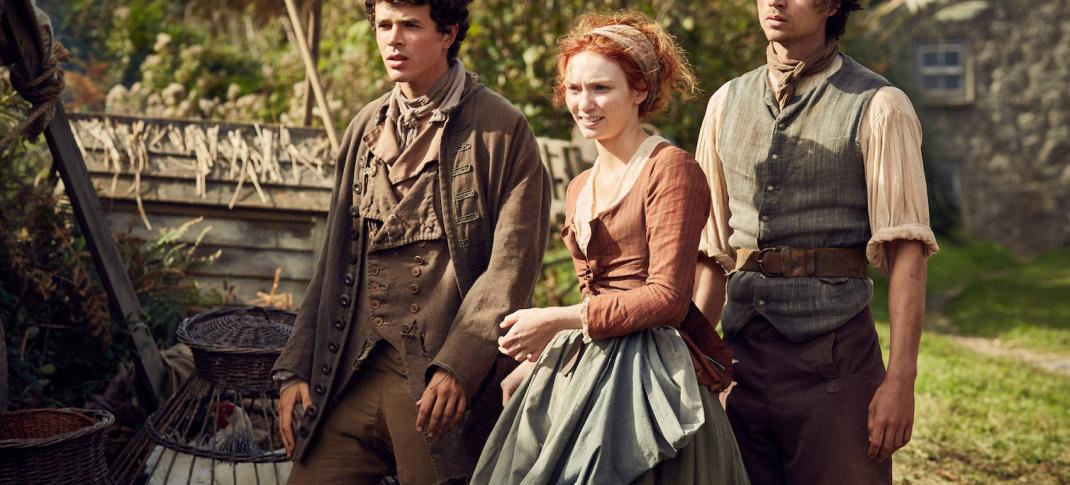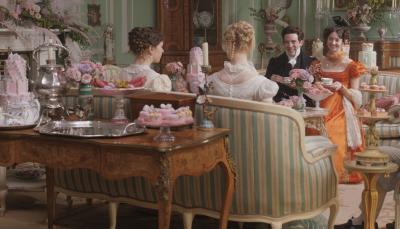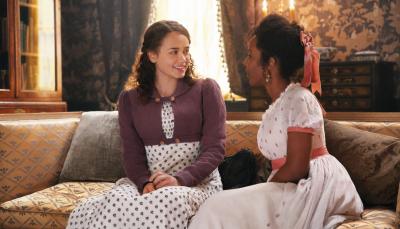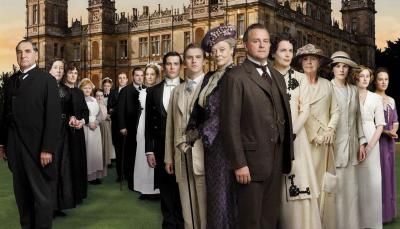'Poldark': Season 3, Episode 5 Recap

Episode Five Sunday, October 29, 2017 at 9pm ET Frogs drive George to the breaking point, leading him to set a trap for Drake. A gift from Geoffrey Charles proves deadly. Dwight’s prison experience threatens his relationship with Caroline. Shown: Harry Richardson as Drake Carne, Eleanor Tomlinson as Demelza Poldark and Tom York as Sam Carne For editorial use only. Courtesy of Robert Viglasky/Mammoth Screen for BBC and MASTERPIECE
Previously, on Poldark: Morwenna tries to break things off with Drake after Aunt Agatha reminds him that Vile George will destroy him in order to punish her, should he find out about their relationship. Ross leads a rescue mission to France to bring Dwight home, during which Drake gets shot, Henshawe dies, and the gang inadvertently saves the hot nephew of a powerful local aristocrat (who also happens to be Enys’ prison BFF). If you need last week's recap for more, it's right here.
Now, on one of the most dramatic episodes of Poldark to date, we’re faced with everything from blackmail to heartbreak to PTSD. And the most amazing part? So little of this episode has to do with Ross. That’s not a criticism, by the way. Poldark works best when it’s a show about more than just one man’s struggle to do and be better. The best thing about this season is that it has expanded its world to other characters and storylines – it’s more enjoyable than its ever been.
I’m shipping Drake and Morwenna like FedEx. At his sister’s urging – because I guess Demelza realized how hypocritical it was of her to try and crush her brother’s romantic dreams in light of her own romantic choices – Drake seeks out Morwenna to make doubly sure she was serious about that whole not loving him thing. Which, of course she wasn’t. Duh! Haven’t you guys ever watched a show like this before?
As we all knew they would, Drake and Morwenna reunite when she admits that she only tried to break things off with him last week because of pressure from others. And the lovebirds make the most of their reunion, kissing passionately in the woods, making out in the dunes on the beach, and just generally declaring their undying devotion toward one another as often as possible. I’m pretty sure that Drawenna’s superpower must be adorableness or something because their scenes, which should be cheesy in the extreme, really work. There’s something that seems pure and innocent about the two of them, like kittens or baby ducks, and whatever it is makes everyone (read: me) want to protect them from all harm. So, of course it should come as a surprise to no one that quite a lot of harm comes for Drake and Morwenna in this episode.

Their relationship is eventually discovered thanks to a subplot involving Drake catching toads and dumping them into the Trenwith pond. (No, really, this is a thing that actually happened.) George and Elizabeth are furious that Morwenna has been seeing Drake, insisting that she’s ruining her reputation and shaming herself, her family and the Warleggans by proxy with her behavior. George, particularly is angry, because he’s determined that Morwenna should marry the awful Reverend Whitworth, and thereby secure him a familial connection to some aristocratic family he is chasing. That neither George nor Elizabeth seems particularly concerned about Morwenna’s feelings on the matter is pretty gross, but not that surprising.
For her part, her reunion with Drake - and his pep talk about choosing to be happy when presented with the opportunity to do so – seems to have helped Morwenna find her courage. Though she is visibly nervous, she stands tall and tells her cousins that thanks very much, but she’d really prefer not to marry the reverend, no matter how advantageous a match it might be. The Warleggans threaten to send her home in disgrace, but having refused them once, she seems to find it much easier to do so a second time.
Whitworth is my new least favorite thing on the show! Reverend Osborne Whitworth’s unctuous nastiness is on full display this week, as he visits prostitutes, reveals a foot fetish that’s extremely uncomfortable to watch, and generally slimes his way wherever he goes. He even has the nerve to tell the Poldarks that he’s working to bring these fallen women to God…by sleeping with them I guess. Ugh. Basically Whitworth is that guy every woman’s encountered more than once – and may have purposefully spilled a drink on – who’s full of themselves, won’t take no for an answer, and has zero regard for things like boundaries or personal space. Whitworth is repellant not just for his abominable personality, but also for the fact that he’d be the worst sort of partner for quiet, kind Morwenna.
The shot of Morwenna, in the moment after she turns down Whitworth’s proposal, when she thinks she’s free, is surprisingly lovely. Ellise Chappell plays her almost shocked joy beautifully, and for a moment it feels as though we’ll all be able to will the girl – and Drake – to happiness together, while we watch.
But of course George ruins all that, sending his goon squad to locate Geoffrey Charles’ Bible, which he’d given Drake as a gift, and accusing him of stealing it – despite the fact that Demelza was also present and vouches for her brother, and that the package had never even been opened. The Bible is so valuable that Drake can be charged with a capital crime, and may hang. Demelza vows to plead with the magistrate, but of course that’s also George, because he sucks and has just been orchestrating the whole town to his will in recent months.
Naturally, though, he’ll drop the charges against Drake if and only if Morwenna marries Osborne. George gets his aristocratic family connection, with the added bonus of punishing the Poldarks, and all of the joy goes out of Morwenna’s eyes during her shotgun marriage ceremony, which George manages to make happen roughly ten minutes later. This show is honestly Days of Our Lives with better outfits sometimes, I swear.

Dwight isn’t doing so great. In other tragedies elsewhere, just because Dwight made it home from France doesn’t mean he’s free of the French prison he was trapped in for so long. He’s got a clearly raging case of PTSD, as evidenced by his inability to bear loud noises or sudden shocks, plus his constantly seeing visions of dead people all the time. Of course, being a man, he won’t tell Caroline what’s going on with him, and instead chooses to keep rebuffing and belittling her affections at every possible moment.
The show does lean a bit too heavily into the idea that Caroline is somehow vacuous or shallow for wanting to provide some comfort and luxury to her husband who spent months sleeping on rocks and starving. Caroline’s entire arc last season was about proving how deep her hidden depths ran, that she was not an airheaded society girl, but a caring woman with a kind and generous heart. Yes, there’s no possible way that Caroline could have any knowledge or experience with what Dwight’s going through. She’s never been to war, or shot a gun, or seen a man bleed out in front of her. But no one will tell her about any of that – in fact, no one will tell her what’s even wrong with Dwight in the first place.
Ross eventually brings dishy Hugh Armitage by to see Dwight, to let him talk out some of his post-France feelings with someone else who was there. And Hugh is suitably wonderful, explaining to Dwight that Caroline has no frame of reference for the things they had to do at war, and he can’t expect her to. He and Ross encourage Dwight to tell his wife the truth of himself now, and, to his credit, he does. I was more than prepared for the show to drag this out further, to make Caroline more visibly unhappy. But Dwight is open and forthright about how his life has changed since he spent months getting shot at amongst dying men. He tells her he feels guilty for being alive, that he’s startled by virtually every noise, that having so much, now, is uncomfortable. Dwight is teary and scrawny and looks like a sad Muppet, all thin and sickly and worn. He asks Caroline to bear with him while he tries to heal, and she says of course, because she loves him, and because she has always been something more than anyone gave her credit for.

George and his general terribleness. In the space of one episode, George Warleggan falsely accuses a man of theft, plans to have him hanged even though he knows he is innocent, forcibly sends his stepson away to school and blackmails his ward into a marriage she doesn’t want. Nuance is definitely dead.
Honestly, George Warleggan is a great villain. We all despise him. There’s probably not a Poldark viewer out there who wouldn’t cheer if he just happened to get run over by a carriage next week. But his character is exhaustingly two-dimensional. Yes, Elizabeth is not exactly being her best self this season, but, whether we like it or not, we can at least see some reason for WHY she does the things she does. George, on the other hand, is almost singularly motivated by his blind hatred for Ross, and virtually any action he takes is based on the guiding principle of whether or not it actively makes life worse for a Poldark somehow.
Jack Farthing certainly deserves lots of praise for his ability to make Warleggan so entertainingly vile onscreen, but as a villain he’s awfully one-note. George’s behavior isn’t particularly layered or interesting, he’s basically just constantly the worst version of himself at all times. He has no redeeming qualities, and his terrible ways aren’t even enjoyable to watch. His primary purpose is merely to serve as an adversary for Ross, though not a particularly interesting one. (This is likely because Ross himself frequently lives in such a grey area that he can only consistently be a hero when contrasted against someone as irredeemably vile as George.)
There’s so much to talk about this week. Hit the comments and lets discuss.




